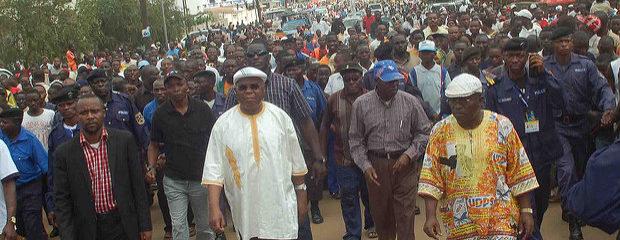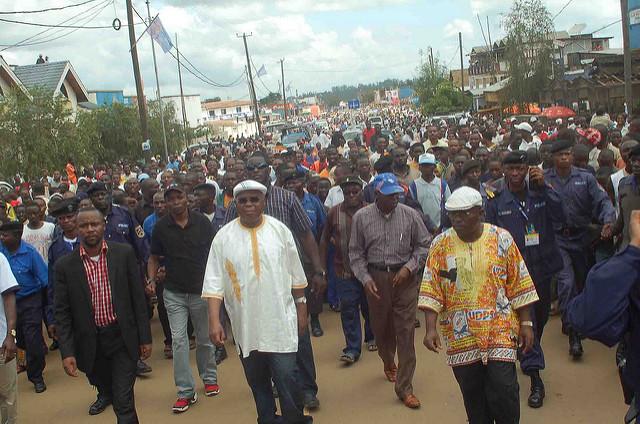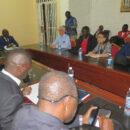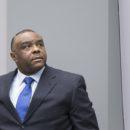What does opposition leader Tshisekedi’s death mean for DR Congo’s road to elections?

The death of the veteran politician deprives the opposition of a well-known rallying figure. Without him, uncertainty and growing popular anger are likely to lead to more instability.

The veteran opposition politician leading a rally in 2011. Credit: VoteTshisekedi.
The death of prominent opposition leader Etienne Tshisekedi has deprived the Democratic Republic of Congo (DRC) of a unique political figure who was at the forefront of the fight for democracy for over three decades.
His loss is a major blow to the main opposition coalition, the Rassemblement, which he led alongside the relative newcomer, ex-Katanga Governor Moïse Katumbi. It also undermines the DRC’s faltering transition and may play into the hands of the ruling majority that has consistently sought to delay elections.
Coming just a month after the signing of a political agreement, which would have put him at the head of an important follow-up committee, his departure robs the opposition of a leader able to combine genuine street-level popularity with an ability to squeeze out political deals. As popular anger mounts, the opposition will have to work hard to rebuild a credible leadership, capable of concluding a deal with the majority.
[The best way to honour Tshisekedi is to fight for democracy in DR Congo]
A fragmented opposition loses its figurehead
The 84-year-old Etienne Tshisekedi launched the Union for Democracy and Social Progress (UDPS) opposition party in 1982 and built a strong following in his native Kasai region and in the capital Kinshasa. He symbolised the struggle for democracy in the waning days of the President Mobutu Sese Seko regime. He also opposed President Laurent Kabila, who overthrew Mobutu in 1997, and his son Joseph Kabila, the current president.
Unable to resist the populist option, he made a strategic error when he boycotted the relatively credible 2006 elections. In 2011, he ended up coming second in a hard-fought but less credible election, and did not accept the result, proclaiming himself president in a parallel swearing in ceremony.
In more recent years, despite living abroad, he again became the symbolic figurehead of the struggle for democracy, this time over the defence of the constitution, and particularly its two-term limit for the president, and the need to organise elections on time in December 2016. They have since been delayed.
This position allowed him to improve cooperation with his fellow opposition leaders, and in June 2016 he was a driving force behind the creation of the Rassemblement, combining the forces of several parties and high-profile figures, including Moïse Katumbi and those in the “G7” (an umbrella group of opposition parties that left the ruling majority in 2016), giving the opposition renewed cohesion and strength.
When Tshisekedi returned to Kinshasa on 27 July 2016 after years of self-imposed exile, he was greeted by massive crowds, demonstrating his unique credibility and ability to get people out onto the street. These were seemingly undamaged by simultaneously being in direct and secretive talks with Kabila’s governing majority.
As president of the Rassemblement’s “governing council” (Conseil des sages), Tshisekedi provided legitimacy and political credibility to the other parties and individuals, most of whom had been part of the ruling majority or held positions in government. These actors needed Tshisekedi’s street credibility and popularity as they tried to build a more pragmatic negotiation strategy. At several moments, tension within the Rassemblement was palpable as the G7 tried to manage the unpredictability of the platform’s leader.
After the elections were pushed back by 18 months, a combination of mounting popular tension and pressure by the international community led to the signing of the 31 December 2016 global and inclusive agreement mediated by the Congolese Catholic Church. It called for a transitional government, a promise that President Kabila will not run for another term, and elections to be held in 2017. Tshisekedi no longer had the physical strength to participate in the talks, but his symbolic importance was underlined when he was appointed as the president of the critical follow-up committee, the Conseil National de suivi de l’accord et du processus électoral (CNSA).
The transition process stalls
Tshisekedi left Kinshasa on 24 January as negotiations on the implementation of the 31 December agreement stalled over several issues, including the procedure to appoint a new prime minister and the division of ministerial positions. The lack of progress, in the context of deepening economic malaise and insecurity in several provinces, including Tshisekedi’s native Kasai Central, will increase popular frustrations and tensions.
[Hungry for change: the economics underlying DR Congo’s political crisis]
Tshisekedi had symbolic importance for the population; despite his at times vainglorious or inflammatory approach, he represented hope of a better political future. Those now taking over the mantle of political opposition will find it hard to channel the frustrations of the population, already deeply sceptical about politicians, into constructive political engagement. The only moral authority and beacon of hope at this stage remains the Catholic Church, currently attempting to resuscitate the agreement it mediated in December.
Before his demise, Tshisekedi’s party had already been struggling with the succession question. And while some have been pushing for Tshisekedi’s son Felix to take over, others refuse moves that make the party seem like a hereditary monarchy, whatever the strength of the name Tshisekedi. This struggle played out in the broader political negotiations and disputes over who should become prime minister, with some pushing for Felix to take that role in the name of the Rassemblement.
The opposition now faces considerable challenges, especially after the earlier loss of Charles Mwando Nsimba, the G7’s president and Rassemblement’s vice-president, who died in December. Moïse Katumbi would be an obvious choice to take on a more prominent leadership role. But he is still in a form of exile abroad, pending an eventual agreement on his judicial prosecution (a sensitive case, that is now, per the December agreement, managed by the National Episcopal Conference of Congo [CENCO]). Moreover, while Katumbi has a certain national popularity, he does not have the political party, political weight or legitimacy as an opposition leader that Tshisekedi could command.
[Moïse Katumbi and the Congo’s race for the presidency]
Talks that had been extended for a week by CENCO after the failure to meet the 28 January deadline are likely to be halted for a while during the funeral and mourning period. After that, there is an opportunity for political leaders to work in good faith to implement the 31 December agreement and to open up political space. But renewed popular anger will be an increasing challenge as people’s faith in the political process plumbs new depths.
Hans Hoebeke and Richard Moncrieff are respectively Senior Analyst for Congo and Central Africa Project Director of International Crisis Group, the independent conflict prevention organisation.







The death of prominent opposition leader Etienne Tshisekedi was not unexpected, as the past year 2016 witnessed his physical along with his intellectual degradation in his capacity to articulate with any degree of disciplined clarity in strength.
Unfortunately, the death of Mr. Tshisekedi now places the opposition political elements in disarray as the numerous DRC Political Entities now alas jockey for political power position.
What now is clearly needed in DRC social civic civil publics is an individual to step up in DRC Publics in speaking ‘truth to power’ to the DRC Leadership Cadre who seem most reluctant to give up any perquisites of power inclusive of governance privilege in theft.
The Citizens of DRC are at present most upset and distressed with the status quo who continue to govern in theft and pillage resulting in the denial to the citizen resources dedicated in strengthening the institutions essential for health care along with institutions to foster education, as a nation is vibrant and strong when the people are healthy and are provided with the intellectual technical tools allowing them active positive participation in the national economy.
Unfortunately, the DRC Status Quo Leadership Cadre will be the beneficiary of Tshisekedi’s death as the opposition unless disciplined within the ethos of national service will undoubtedly fracture due to internecine posturing for private party national power influence.
A civic civil political transformation in DRC publics must occur whereby the national interest is placed above personal interest.
The objective must be that of ensuring National Elections in DRC by November 2017 as anything else would prove deleterious in DRC social civic civil cohesion.
The DRC Citizen is restless as the DRC Citizen wish only to express their voice of discontent to the incumbent Leadership Cadre via the civic civil social electoral process resulting in ideally a freely chosen Leadership Cadre who will govern within the ethos of respecting the ‘social contract’ inclusive in respecting fully the rule of law.
Etienne Tshisekedi’s political public values to be respected ordinal should inspire among all the political party factions the desire to caucus in unison ensuring elections to standard in DRC by November 2017.
Will start by making a correction, The author says that Tshisekedi built a strong following in his native Kasai region and in the capital Kinshasa,? that was not truth, He had a Strong national following that is the key to his success. Unless the author ignore that all movement of social disobedience in the 90’s were organized by Tshiekedi and his UDPS, also he proved it the last time when he toured the entire country in 2011 before the election. But the Challenge the opposition I men RAssemblament has today is to come up with a concrete solution on how to prevent Kabila from reviewing the constitution that will be accepted by the population. Because The any deals that will happen without Tshisekedi and favoring Kabila in any shape or form will be viewed by the population as a betrayal and will leand further violence. That is the fine line that opposition has to walk right now.